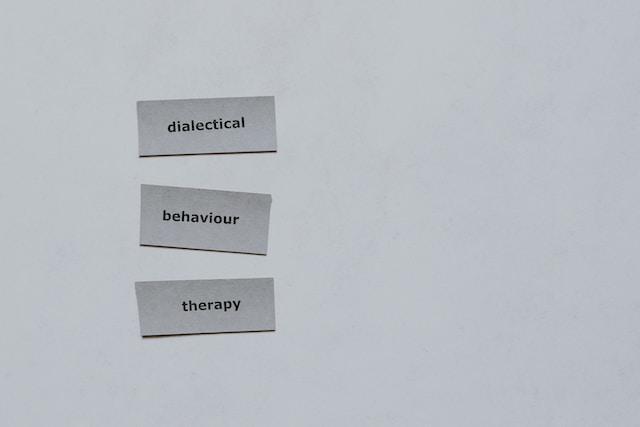Trip to Self-Discovery: DBT London's Thoughtful Treatment
Trip to Self-Discovery: DBT London's Thoughtful Treatment
Blog Article
Nurturing Emotional Resilience and Self-Awareness With Dialectical Behaviour Treatment (Dbt) Solutions: Your Journey to Inner Peace
In the search of psychological resilience and self-awareness, the utilization of Dialectical Practices Therapy (DBT) solutions uses a structured strategy that incorporates various basic principles to foster internal peace. Recognizing the core tenets of DBT supplies a strong structure for individuals looking for to navigate their emotional landscape with higher clarity and control. By diving into the intricacies of psychological policy, social efficiency, mindfulness techniques, and distress tolerance strategies, one embarks on a transformative journey in the direction of enhanced wellness and self-discovery. The path to inner tranquility with DBT solutions is not nearly taking care of emotions however additionally regarding growing a deeper connection with oneself and others, ultimately bring about a much more unified existence.
Comprehending DBT Principles
An in-depth comprehension of Dialectical Actions Treatment (DBT) principles is necessary for comprehending its concepts and application in psychological durability. DBT is a restorative approach developed by Marsha M. Linehan to assist individuals fighting with psychological dysregulation, commonly connected with problems like borderline character condition. The core concepts of DBT rotate around four main modules: mindfulness, distress resistance, emotion regulation, and interpersonal performance. Mindfulness is the structure of DBT, stressing existing moment awareness without judgment. Distress tolerance abilities outfit people to sustain and endure dilemmas without making impulsive decisions (DBT London). Feeling guideline methods assist individuals recognize and take care of extreme emotions efficiently. Interpersonal effectiveness abilities instruct individuals just how to assert their requirements while maintaining relationships. By recognizing these fundamental facets of DBT, people can cultivate psychological resilience by discovering to manage their emotions, navigate relationships, and handle upsetting circumstances much more effectively. This foundational understanding establishes the phase for the successful application of DBT concepts in advertising mental well-being and inner peace.
Developing Emotional Guideline Abilities

One trick element of developing psychological policy abilities is discovering to recognize and classify various emotions properly. This self-awareness allows individuals to determine the origin of their feelings and react appropriately (DBT London). Furthermore, practicing mindfulness methods can help people stay present in the minute and avoid frustrating emotions from pirating their thoughts and activities
Additionally, implementing healthy coping approaches, such as deep breathing exercises, dynamic muscular tissue relaxation, or basing techniques, can supply people with effective devices to manage their emotions throughout times of distress. By consistently exercising these skills, individuals can construct a strong foundation for psychological strength and self-awareness, ultimately promoting internal tranquility and wellness.
Enhancing Interpersonal Performance


With a solid structure in psychological policy skills, people can now focus on sharpening their social efficiency to navigate social communications with higher ease and success. Social effectiveness, an important component of Dialectical Practices Therapy (DBT), equips people with the required tools to interact assertively, set borders, and build much healthier connections. By learning to reveal viewpoints and needs clearly like this while respecting the point of views of others, people can cultivate extra significant links and decrease problems in their interactions.
DBT stresses the significance of reliable communication, training people how to proactively listen, verify others' feelings, and insist their very own needs without being hostile find more information or passive. This ability set enables people to browse challenging discussions with self-confidence and empathy, fostering understanding and cooperation in their relationships. In addition, by creating abilities to handle interpersonal problems constructively, people can maintain much healthier boundaries, advocate for themselves, and discuss compromises when differences occur.
Eventually, enhancing interpersonal performance via DBT empowers people to browse various social contexts with empathy, resilience, and credibility, fostering more fulfilling and unified connections in their lives.
Exercising Mindfulness Techniques

One basic mindfulness strategy utilized in DBT is the "wise mind" principle, which motivates people to integrate their reasonable and psychological minds to make balanced choices. This method makes it possible for individuals to navigate psychological triggers with a calmer and more reasonable approach, minimizing spontaneous responses. Additionally, mindfulness methods aid in grounding individuals in the here and now minute, steering them away from rumination on past occasions or anxiety regarding the future.
Structure Distress Resistance Strategies
To improve psychological strength in people undergoing Dialectical Behavior Therapy (DBT), it is necessary to concentrate on building reliable distress resistance strategies. Developing these techniques is vital for people to browse via difficult scenarios without becoming overwhelmed (DBT London). Distress tolerance skills help individuals withstand and cope with extreme emotions, dilemmas, or scenarios where they may be tempted to engage in hazardous habits
One secret distress tolerance technique usually taught in DBT is the ACCEPTS acronym, which represents Tasks, Contributing, Comparisons, Feelings, Pressing away, Ideas, and Feelings. These abilities offer individuals with a toolbox of strategies to sidetrack themselves from traumatic feelings or circumstances in a healthy manner.
In addition, finding out just how to self-soothe with activities like deep breathing workouts, taking a cozy bath, or participating in hobbies can additionally assist develop distress tolerance. By incorporating these approaches right into daily practice, people can better manage stress and anxiety, control emotions, and ultimately grow a higher sense of psychological durability.
Conclusion
Finally, the journey in the direction of internal peace via Dialectical Behaviour Therapy (DBT) includes understanding its principles, establishing emotional guideline skills, boosting interpersonal performance, practicing mindfulness methods, and building distress resistance techniques. By making use of these methods, people can nurture psychological durability and self-awareness, bring about a higher sense of internal peace and well-being. Integrating DBT services right into one's life can provide useful tools and sources for managing emotions and partnerships successfully.
Recognizing the core tenets of DBT offers a strong foundation for individuals looking for to navigate their emotional landscape with better clarity and control. By comprehending these basic aspects of DBT, people can grow emotional durability by discovering to handle their emotions, navigate partnerships, and deal with upsetting circumstances extra efficiently.Mindfulness methods play a crucial role in improving psychological policy and promoting self-awareness in people undertaking Dialectical Practices Therapy (DBT)One fundamental mindfulness method used in DBT visit our website is the "sensible mind" principle, which urges individuals to integrate their psychological and reasonable minds to make balanced decisions.To enhance emotional resilience in individuals undergoing Dialectical Behavior Treatment (DBT), it is necessary to concentrate on structure reliable distress resistance approaches.
Report this page